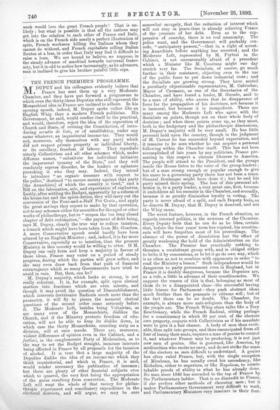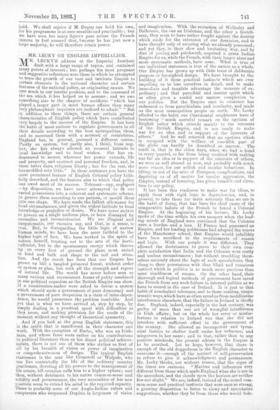THE FRENCH PREMIER'S PROGRAMME.
MDUPUY and his colleagues evidently believe that France has sent them up a very Moderate Chamber, and they have put forward a programme to which even the thirty-three Deputies who still represent the Monarchical idea in France are inclined to adhere. In his opening speech, indeed, M. Dupuy spoke rather like an English Whig than a modern French politician. His Government, he said, would confine itself to the practical, and would, therefore, reject the idea of the separation of Church and State, of revising the Constitution, of intro- ducing scrutin de liste, or of establishing, under any name whatever, an inquisitorial income-tax. They would not, moreover, ally themselves with any party which did not respect private property or individual liberty, or its corollary, freedom of labour. They repudiate utterly Collectivism and all other schemes which, under different names, " substitute for individual initiative the impersonal tyranny of the State," and they will resolutely repress disorder, be the leaders or agitators provoking it who they may. Indeed, they intend to introduce " an organic measure with respect to the police," destined " to ensure society against that party [the Anarchists] of which the country is tired," and a Bill on the fabrication, sale, and exportation of explosives. Lastly, after settling the Budget, apparently by a reform of the house-tax and the spirit-duties, they will carry out the conversion of the Four-and-a-Half Per Cents., and apply the great savings they expect to make by that operation, not to any schemes either for annuities for the aged or other works of philanthropy, but to " reopen the too long closed chapter of debt redemption,"—the payment of debt being, says M. Dupuy, clearly the true way to reduce taxation, a remark which might have been taken from Mr. Goschen. A more Conservative speech could hardly have been uttered by an English Minister; and, indeed, it is far more Conservative, especially as to taxation, than the present Ministry in this country would be willing to utter. If M. Dupuy can only form and keep a majority in. favour of these ideas, France may enter on a, period of steady progress, during which the parties will grow softer, and she may even draw back from that path of financial extravagance which so many Governments have tried to avoid in vain. But, then, can he?
M. Dupuy's majority, which looks so strong, is not really coherent. It is, for example, split upon clerical matters into fractions which are even minute, and though it may avoid the question of Disestablishment, which interests doctrinaire Radicals much more than the peasantry, it will fly to pieces the moment clerical questions of the second order come seriously before it. The Moderate Left, besides being Voltairian, as are many even of the Monarchists, dislikes the Church, and if the Ministry protects freedom of edu- cation, will not be able to keep its dislike down, in which case the thirty Monarchists, counting sixty on a division, will at once secede. There are, moreover, violent differences of opinion even in the Cabinet, and a fortiori, in the conglomerate Party of Moderation, as to the way to set the Budget straight, immense interests being affected in France by all proposals for the taxation of alcohol. It is true that a large majority of the Deputies dislike the idea of an income-tax which they think inquisitorial, and which in France, it is said, would render necessary the publication of incomes ; but there are plenty of other financial subjects over which to quarrel, the very first being the appropriation of the gains resulting from conversion. The Moderate Left will want the whole of that money for philan- thropic experiment and conciliatory expenditure in the electoral districts, and will argue, we may be sure somewhat savagely, that the reduction of interest which will not stop in peace-time is already relieving France of the pressure of her debt. Even as to the sup- pression of anarchy, there is no real unanimity. The police want, and the Government will probably con- cede, " anticipatory powers,"—that is, a, right of arrest- ing Anarchists before anything has occurred ; and the Moderate Left, represented by M. Peytral in the Cabinet, is not unreasonably afraid of a precedent which a Minister like M. Constans might one day stretch very far. The Socialists, of course, go much further in their resistance, objecting even to the use of the public force to put down industrial riots ; and the Socialists are growing strong. They have seated a peculiarly objectionable representative, M. Calvinhac, Mayor of Carmaux, as one of the Secretaries of the Chamber, and have found a leader, M. Gueade, said to be a man of ability, who avows that he disapproves of force for the propagation of his doctrines, not because it is immoral, but because it is inexpedient. There are many among the Moderate Left who agree with the Socialists on points, though not on their whole body of doctrine ; and when these points come up, as they must, both in the budgetary and the philanthropic discussions, M. Dupuy's majority will be very small. He has little personal hold upon the country, though in the judgment of M. Carnot he has succeeded beyond expectation, and it remains to be seen whether he can acquire a personal following within the Chamber itself. This has not been accomplished of late years by any politician, France pre- senting in this respect a curious likeness to America. The people will attend to the President, and the groups inside the House listen to the voice of the group-leaders ; but of a man strong enough or popular enough to give his name to a governing party there has not been a trace. General Boulanger might have done it ; but he and his party missed their spring. The loss of this personal ad- hesion is, to a party leader, a very great one, first, because it emboldens all his enemies in the Chamber, and secondly, because it so greatly diminishes loyalty in voting. The party is never afraid of a split, and each Deputy feels, as he deserts M. Dupuy, that M. Dupuy is deserted, and not the Whig cause.
The worst feature, however, in the French situation, as regards internal politics, is the newness of the Chamber. Every Deputy feels that he can do as he likes, certain that, before the four years' term has expired, his constitu- ents will have forgotten most of his proceedings. The absence of the power of dissolution has the effect of greatly weakening the hold of the Administration on the Chamber. The Premier has practically nothing to threaten a recalcitrant group with, and is obliged either to bribe it by concessions, or to let it go its own way, which is as often as not to combine with opponents in order " to read the Ministry a lesson." Such independence would be dangerous to party government even in England, but in France it is doubly dangerous, because the Deputies are, as a rule, a little in advance of their constituencies. We suppose the reason of this is that, belonging as most of them do to a disappointed class—the successful having little leisure for Parliament—they push abstract ideas much further than the peasants or citizens will ; but of the fact there can be no doubt. The Chamber, for example, is always more anti-religious than the body of the people are. The French Whig often talks like a Tory Reactionary, while the French Radical, sitting perhaps for a constituency in which 90 per cent. of the electors own property, coquets with Collectivism as if his mandate were to give it a fair chance. A body of men thus excit- able, thus split into groups, and thus emancipated from all fear of losing their seats, requires a man of genius to control it, and whatever France may be producing, it is not just now men of genius. She is governed, like America, by mediocrities who excite no envy, and do not strike the mass of the electors as men difficult to understand. A genius has often ruled France, but, with the single exception of Mirabeau, he has usually owed his ascendency, like Richelieu, either to superiors, or like Napoleon, to unmis- takable proofs of ability in what he has already done. No man since 1848 has ascended to the top of France by the Parliamentary ladder. That is no discredit to France, if she prefers other methods of choosing men ; but it makes Parliamentary Government very difficult to work, and Parliamentary Ministers very insecure in their foot- hold. We shall rejoice if M. Dupuy can hold his own, for his programme is at once sensible and practicable ; but we have Been too many figures pass across the French camera to feel assured that, because he has just now a large majority, he will therefore retain power.







































 Previous page
Previous page